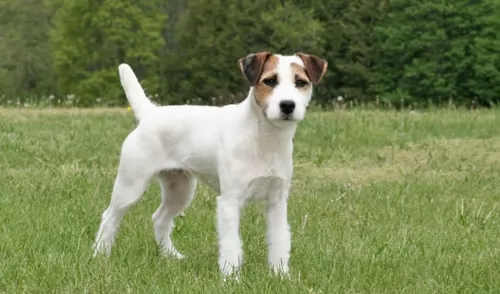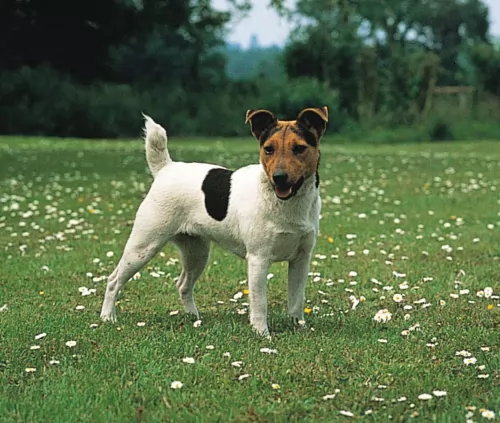 Petzlover
PetzloverJack Russell Terrier is originated from United Kingdom but Kuri is originated from French Polynesia. Jack Russell Terrier may grow 8 cm / 3 inches shorter than Kuri. Jack Russell Terrier may weigh 7 kg / 15 pounds lesser than Kuri. Both Jack Russell Terrier and Kuri has almost same life span. Both Jack Russell Terrier and Kuri has same litter size. Both Jack Russell Terrier and Kuri requires Low Maintenance.
 The popular Jack Russell Terrier was developed in Devonshire in the south of England in the late 1800's so as to hunt foxes.
The popular Jack Russell Terrier was developed in Devonshire in the south of England in the late 1800's so as to hunt foxes.
Often believed to be the Parson Russell Terrier, the Jack Russell Terrier was developed by Parson John Russell. This is where the dog gets his breed name from. Some people get the Jack Russell Terrier a little bit mixed up with the Parson Russell terrier, when it fact its actually a different breed, but sharing a common ancestry.
The Jack Russell Terrier is smaller than the Parson and bigger than the Russell Terrier. The breed became known in the U.S. by the 1930s and the Jack Russell Terrier Association of America wanted recognition by the American Kennel Club, which was granted in 2000.
Kurī, also known as Guri or Peroor New Zealand Native Dog, is the Maori name for this dog which was introduced to New Zealand by the Maoris when they migrated from East Polynesia around 1280 AD.
They were in fact Polynesian dogs which died out in New Zealand. The Māoris would use the dog as a food source and the skins would be used to make some form of clothing. The bones were used to make items such as necklaces and fish hooks.
Not surprising then that the dog became extinct in New Zealand, with the last known Kuri specimens being found in the Museum of New Zealand Te Papa Tongarewa.
 The Jack Russell Terrier is a small dog that weighs between 6 and 8kg and stands at between 25 – 38cm. The body length of the dog should be in proportion to the height.
The Jack Russell Terrier is a small dog that weighs between 6 and 8kg and stands at between 25 – 38cm. The body length of the dog should be in proportion to the height.
He is essentially a white dog with orange or fawn colored patches. The coat is mostly smooth and short, but the coat can also be longer and rough or it can be broken which is a combination of rough and smooth. Regardless of coat type, they are dense, double coats which will require brushing at least twice a week to remove loose hairs. He may also be tri-colored such as being white with black and tan patches.
He has alert, bright dark brown eyes and ears which are somewhat erect and which flop over at the tips. The tail has always been traditionally docked, giving him an attractive, compact look about him but unfortunately the tail is often left long on the dog these days.
Your Jack Russell Terrier is a lively, tenacious, bold, fearless, feisty, cheeky, confident, independent, intelligent and full of life dog. He is super energetic and exuberant, spirited and full of personality.
There are some dog owners who are exhausted by him and would prefer a more quieter dog breed as their companion. Nonetheless he has some excellent characteristics such as being a totally devoted and loving dog.
It is why it is a good idea to have him trained and socialized as it calms him down and makes him more obedient. He is very intelligent and training him will be easy.
The Kuri is extinct now but it was a small to medium sized dog with a thick set neck. He stood between 25 and 46cm and weighed about 13 to 15 kilograms.
He had thick medium-length rough textured hair, small head, erect ears, short legs and a bushy tail. The color of their weatherproof coats varied and some were black, some white or cream and some were a mix of colors and patterns.
An interesting feature about them is that they didn’t bark but instead they howled. They were good at hunting birds.
The Kuri wasn’t considered the brightest breed, but he would have benefited from some training and socialization as this just makes a dog a better pet in every sense – more obedient and better behaved in all situations.
Some Kuris were friendly and able to bond with their human owners, while others were independent and somewhat aloof. Their size would have allowed them to be kept in the city or the country as they weren’t particularly energetic dogs, not requiring much ground to run around in.
 With loads of vibrant personality, the energetic Jack Russell Terrier has got so many wonderful characteristics to his name – devotion, intelligence, charming, lively, playful and he is an entertainer – you’ll always be laughing a him.
With loads of vibrant personality, the energetic Jack Russell Terrier has got so many wonderful characteristics to his name – devotion, intelligence, charming, lively, playful and he is an entertainer – you’ll always be laughing a him.
You do need to pay him attention – you can’t just plonk him in your backyard and forget about him. He wants your love and attention and ignoring him can lead to problem behavior such as obsessive barking.
Give your Jack Russell Terrier all the love and care he needs, and you’ll have an exceptional pet and friend.
It appears as though some Kuris were kept as pets and that they were able to develop loving relationships with their owners.
We don’t know too much about the extinct Kuri, but scientists are now studying and analyzing the hairs of the dog to find out more about it, and specifically why the Maori dog disappeared some time in the 19th century without a trace.
They will also be analyzing Kuri bones salvaged by archaeologists and which were found on rubbish heaps. These bones can be tested to see whether the diet of the Kuri changed much between the days of Maori settlements and the arrival of the European settlers.
 This particular dog breed has a reputation for being healthy and living to a good age such as 16 or 17 years of age. Of course he needs to be given proper care to reach such a good age.
This particular dog breed has a reputation for being healthy and living to a good age such as 16 or 17 years of age. Of course he needs to be given proper care to reach such a good age.
Some common dog disorders you might want to be aware of are -
Lens luxation is actually a common hereditary disorder in these dogs, but even so, with good care, your dog isn’t likely to battle with it. What happens is that the lens in the eye becomes displaced. There are two types, with Posterior luxation being the lesser severe one.Treatment is available.
Patellar luxation is an hereditary disorder affecting the knees of the dog. The kneecap slips off the groove where it sits and you may notice your dog running while holding his hind leg in the air. It can sometimes slip back in place and then you see your dog running in his usual way. It becomes more serious when it affects both legs.
Some Kuri dogs scavenged while others were pets and ate well. The lifestyle they led would have determined their health. In those days they would have suffered with dental disease, common in adult dogs. Left untreated, dental disease can lead to dental tartar buildup with gum inflammation and tooth loss.
Dental disease can also lead to other organ diseases. These days brushing your dog’s teeth with canine toothpaste and toothbrush can help to ward off dental disease.
Those Kuris that weren’t pets, tried to survive scavenging, and their homeless situation could well have led to ear infections – caused from a wax- and dirt buildup within the ear. He would have been frantic trying to scratch his ears. In modern times, if your dog showed signs of an ear infection, you would need to get him to the vet.
 The Jack Russell Terrier isn’t just a small dog that can be left to his own devices. He will need proper training and socialization early in life to make him obedient and better to get on with.
The Jack Russell Terrier isn’t just a small dog that can be left to his own devices. He will need proper training and socialization early in life to make him obedient and better to get on with.
He may be a small dog, but he certainly won’t do in the city where he is cooped up in a place with a handkerchief of a garden. He needs lots of space to run and play. He wants his human family to join in with walks, hikes, ball games and swimming.
You can buy excellent commercially manufactured dog food which caters for energetic small dog breeds like the Jack Russell Terrier.
Once you have selected the best one for your pet, with dry kibble being better in terms of dental health - you can also add in some brown rice, vegetables and cooked chicken. This is highly beneficial to all dog breeds. A little bit of raw meat can sometimes be added in too.
The bottom line is to to prevent your pet from eating foods high in preservatives, additives and fillers. Never leave your pet without a constant supply of fresh, cool water.
The Kuri will have required regular grooming which means a brushing down twice a week. Brushing would have been useful to prevent loose hairs from shedding with the dog. He would have had to have his ears and eyes checked too to avoid infections. Brushing him would have given his owner the chance to check him over for fleas and ticks too.
As the Kuri wasn’t an overly energetic dog, a walk a day would have kept him content and fit.
The Kuri was a dog that essentially formed part of someone else’s diet. Those that managed to escape being a meal for someone no doubt had to scavenge for food. Because they were used to help people catch birds, they themselves were used to catching birds for themselves.
As a small to medium sized dog, if you were to keep such a dog as a pet you would have given him a cup or two of dried kibble a day and tried to vary his diet by including some home-cooked food and raw meat.